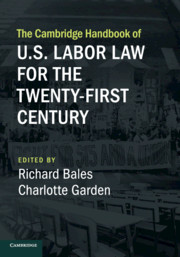Book contents
- Advance Praise for The Cambridge Handbook of U.S. Labor Law for the Twenty-First Century
- The Cambridge Handbook of U.S. Labor Law for the Twenty-First Century
- The Cambridge Handbook of U.S. Labor Law for the Twenty-First Century
- Copyright page
- Contents
- Contributors
- Preface
- Acknowledgments
- Part I Introduction
- Part II Labor Law Is Out of Date
- 3 Yesterday’s Labor Law and Today’s Challenges
- 4 The National Labor Relations Board in the Twenty-First Century
- 5 Beyond the Race to the Bottom
- 6 Union Rights for All
- 7 Public Sector Innovations
- 8 Combatting Union Monopoly Power
- 9 The Case for Repealing the Firm Exemption to Antitrust
- 10 Make Labor Organizing a Civil Right
- Part III The “Fissured” Workplace
- Part IV Barriers to Forming a Collective Bargaining Relationship
- Part V Barriers to Bargaining a Good Contract
- Part VI Unions, Civil Society, and Culture
10 - Make Labor Organizing a Civil Right
from Part II - Labor Law Is Out of Date
Published online by Cambridge University Press: 01 November 2019
- Advance Praise for The Cambridge Handbook of U.S. Labor Law for the Twenty-First Century
- The Cambridge Handbook of U.S. Labor Law for the Twenty-First Century
- The Cambridge Handbook of U.S. Labor Law for the Twenty-First Century
- Copyright page
- Contents
- Contributors
- Preface
- Acknowledgments
- Part I Introduction
- Part II Labor Law Is Out of Date
- 3 Yesterday’s Labor Law and Today’s Challenges
- 4 The National Labor Relations Board in the Twenty-First Century
- 5 Beyond the Race to the Bottom
- 6 Union Rights for All
- 7 Public Sector Innovations
- 8 Combatting Union Monopoly Power
- 9 The Case for Repealing the Firm Exemption to Antitrust
- 10 Make Labor Organizing a Civil Right
- Part III The “Fissured” Workplace
- Part IV Barriers to Forming a Collective Bargaining Relationship
- Part V Barriers to Bargaining a Good Contract
- Part VI Unions, Civil Society, and Culture
Summary
The right to organize has been poorly protected for decades in the United States, and the situation is growing even more dire under the current administration, which was supposed to be dedicated to the interests of “forgotten Americans.” For example, in a single week in mid-December 2017, President Trump’s National Labor Relations Board (NLRB) released a series of 3–2 decisions that overturned major precedents of the Obama and Bush II Boards. These included the hard-won changes in standards concerning joint employers, employee handbooks, union discretion in defining bargaining units, and employer rights to make unilateral changes to the contract. Further, it started the process of rescinding the Board’s 2015 rule that shortened election times. The moves were so swift and so extreme that former Board Member Sharon Block asked if it was a “December Massacre.” Sadly, this has become the norm, where labor rights advocates make incremental gains at the NLRB during Democratic administrations, and those gains get wiped away quickly during Republican administrations.
- Type
- Chapter
- Information
- Publisher: Cambridge University PressPrint publication year: 2019
- 1
- Cited by

